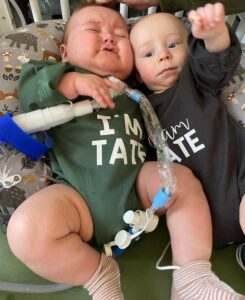Katie Beckett’s parents advocated for better home care regulations, resulting in the creation of the Katie Beckett Waiver.

Today, May 18, marks the sixth anniversary of Katie Beckett’s death. Katie, namesake of the well-known Katie Beckett waiver, was able to live at home due to her parents’ commitment to advocating for better home care policies.
Former secretary of health and human services Kathleen Sebelius called Katie “an inadvertent pioneer in the civil rights movement for people with disabilities” and the inspiration for regulations that have allowed more than 500,000 disabled children to live at home since 1981.
Four months after her birth in 1978, Katie contracted viral encephalitis, leaving her partly paralyzed and with lifelong respiratory difficulties. Her parents, who wanted desperately for Katie to live as normal of a life as possible at home, found themselves in bureaucratic limbo. Katie qualified for Supplemental Security Income (SSI), but if she had been taken home, her parents’ incomes would have caused her to lose that eligibility. Yet her hospital care was topping $12,000 a month—six times the cost of home care.
At a news conference in November of 1981, then-President Ronald Regan cited Katie’s case as an example of federal regulations that, though more expensive for taxpayers, force Katie and other medically complex children to stay in institutional settings even though she could be cared for effectively at home.
At the time of the conference, Katie was 3 years old and had been hospitalized since almost birth. The day following the news conference, then-secretary of health and human services Richard S. Schweiker waived federal rules to allow Katie to return home without the loss of federal support.
Secretary Schweiker also created a review board to handle similar cases. Seibelius said that “thanks to her mother, Julie’s, tireless advocacy…Medicaid policy fundamentally shifted” toward supporting home health care.
Home care worked for Katie, and for many others like her that thrive in a home environment surrounded by family and in-home caregivers that give her the proper amount of support. Despite needing nursing care five times a week and 12 hours a day on a ventilator, Katie graduated from Mount Mercy University in 2001 with a degree in English and creative writing. She also held several jobs over the years, including one as a secretary in a homeless shelter. At the time of her death, Katie was 34 years old—more than three times the age her doctors had predicted she would reach.
The Becketts’ advocacy not only allowed Katie to live a safe home life with comfort and dignity, but resonated around the country. The lasting effects of their commitment to their daughter’s well being have allowed for hundreds of thousands of disabled children to come home from the hospital. BAYADA Manager of Client and Family Advocacy Tara Montague is fortunate to raise her medically complex daughter, Mary, at home due to the Katie Beckett waiver, which is called the Community Care Waiver in her home state of New Jersey.
Tara says, “I am forever grateful to Katie Beckett and her parents. Because of their advocacy, my husband and I were able to bring our daughter home after two months in the NICU, and with home care, she’s been able to remain home with us for the past 20 years.”
If you are hesitant about sharing your voice and advocating for better home care policies, please think of Katie, her family, and their work, which has had a lasting effect across the United States. To get involved, please email [email protected] today.
Rest in Peace Katie, your legacy lives on. – March 9, 1978-May 18, 2012.







